Uni High Outreach Focuses on Diversity
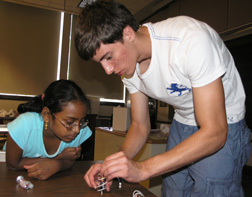
Uni camp counselor helps camper troubleshoot her project.
November 9, 2011
Instead of lounging by the pool to cool off this past summer, University Laboratory High School staff and students were running a summer camp for local youngsters. Being a camp counselor is one of a Uni student’s many outreach opportunities. For example, these community-focused students participate in both SSAT (Secondary School Admission Test) and Booker T. Washington tutoring programs and act as TAs in EnLiST, one of the University’s teacher professional development programs, to name a few.
Uni’s outreach programs have a three-fold purpose: 1) to work with local youngsters, especially from under-represented groups, as an outreach/service to the community; 2) to increase diversity at Uni High; and 3) to give Uni students a more global perspective. According to Dr. Jeff Walkington, Principal and Director of Uni High: “In the last four years, [the camp] has picked up the focus of working on diversity and reaching out to underrepresented groups in the school…Uni is a very difficult school to enter; the application process is very rigorous. So the camp helps us network with institutions in the community who serve the Latino population, who serve the African-American population, who serve low-income children. We can help them—no matter what high school they go to—with training over the summer.”
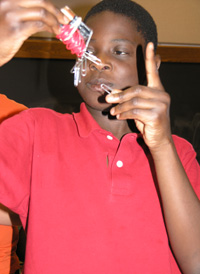
Uni camper demonstrates his magnet project.
Walkington believes outreach activities benefit not only youngsters involved in the various programs, but broaden the experiences of Uni High students by exposing them to persons of cultures/backgrounds other than their own. “Diversity is a large initiative of ours; students will learn more from other students than they would ever learn from us…In this global society, for them to meet folks with a variety of viewpoints is crucial...It makes the school a richer place, with a richer body of opinion and viewpoints.”
One of the crown jewels in Uni’s outreach program is its annual Summer Enrichment Camp. Headed by Uni High counselor Dr. Karl Radnitzer, this past summer’s camp offered a wide variety of topics. While many of this past summer’s topics emphasized STEM (Science, Technology, Engineering, and Mathematics), some programs, “Read, Write, and Reproduce” and “Words at Play,” involved writing, which is necessary in every discipline.
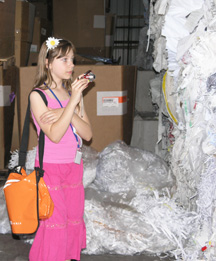
Young journalist takes photo for her web article on recycling for the Headliners camp.
The Headliners and Computer/Technology programs taught by Uni journalism and computer teachers Carol Lombardi and Joel Beesley emphasized both STEM and writing: journalism using communication technologies, including computers, photography software, and videography. Students were to use a variety of media to write a web article on “recycling” to be published on the school website. To help students research the topic, campers toured a local recycling facility. According to Lombardi, the rationale behind this choice involved proximity and availability. Following are several articles written by these young journalists: 1) Roving Reporter: Why should people recycle?
2) Recycling saves money and energy; 3) What Would Happen if People Didn’t Recycle? 4) How to make paper without and with trees;
5) The basics of recycling.
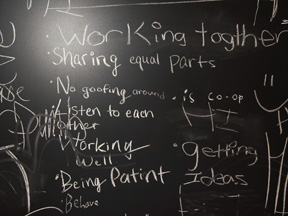
Uni Robotics camp teamwork board.
In Robotics, taught by four-year summer camp veteran Rita Davis, youngsters worked with Lego Mindstorm kits and laptops to build and program robots. Rita's goal: to promote critical thinking. For example, while brainstorming, students would add pithy gems to a teamwork board about what working as a team means. Examples besides those in the image to the right include: “Stay on task, everyone getting ideas; same gender working together; everyone has the same abount of work; no fighting teammates; no one person doing all the work; no bullying!” To Rita, the teamwork board was just part of the critical thinking process: “This stuff is kid generated; that’s the whole point. They’re supposed to be thinking about it themselves." Counselors promote critical thinking and independence by asking qustions like: “What’s worked in the past? What works now? What else have you tried?” Rita’s rather Field-of-Dreamsesque philosophy, in a nutshell, was: “You create an environment, then good things happen!”
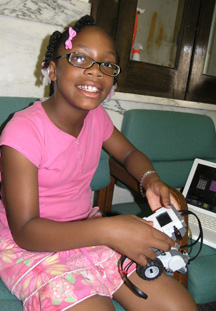
Youngster works with her robot at Uni Robotics camp.
What did campers learn about robots? “I learned about how to program the robot. It’s really cool,” was one camper's response, while another said: “We first used the manual to do things, but there were these challenges that asked us to do other things, and sometimes we had do things with the robot, so we had to imagine, and then we got out the computer, and to do the challenges, we had to build the whole thing.”
In Electricity, Magnets, and Motors, taught by Janet Sheung, an NSF-funded teaching fellow from Illinois’ Center for the Physics of Living Cells, students worked with electricity and magnets to build a simple motor. And finally, one camp, “Everyone Has a Culture— Everyone is Different,” underscored Uni’s outreach philosophy: diversity.
While the camp has been in operation for a dozen years or so, it has recently been acting as a pipeline to attract students from under-represented groups to Uni High. Walkington indicates that many counselors attended the camp themselves when they were younger. “Not only do we see students who have come through that whole process and now attend Uni; lots of times they are involved in leadership roles in Uni, such as being camp counselors themselves...That helps us with the whole thing of having underrepresented groups see that Uni is a diverse place that it is not just for the kids of university faculty—that it is not just for complete brainiacs who aren’t like them.”
Walkington also believes that these outreach experiences might be influencing some of his students to choose careers in teaching. “For our students to work at the camp is an eye-opening experience…A lot of them come away from there knowing how hard it is to be a teacher, which I think is fun. Some of them come away from it thinking that they might want to be an educator, which warms my heart. Of course, the student that won the Director’s Outstanding Student of the Year last year might become a math teacher. I think it is not only because of her strength in math, but she has had to tutor and work with younger students here. That has opened her eyes to that possibility.”
Has the school’s emphasis on outreach to under-represented groups been effective? Yes, according to Walkington: “I feel as though we have had some real victories this year; it is starting to really pay dividends. We have a very strongly diverse subfreshman class this year, so we have all been celebrating a little bit.” Radnitzer would also agree: of the 143 youth who attended last summer’s camp over the 2-week period, 55% were minority students; of the 13 students who participated in SSAT tutoring, 54% were minority students. For Uni High students who don’t necessarily think about things like increasing diversity, Walkington offers another incentive to induce his students to participate: “It is a heck of a lot of fun!”
Note: Suggestions regarding teachers/subjects for next summer's camp are encouraged. Please submit ideas to Dr. Radnitzer at University Laboratory High School.
Author/Photographer: Elizabeth Innes, Communications Specialist, I-STEM Education Initiative
More: K-6 Outreach, Underserved Minorities in STEM, Uni High













.jpg)
















